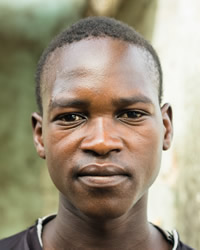Abu Sharib in Chad

Photo Source:
Mark Fischer - Flickr
Creative Commons
|
Send Joshua Project a map of this people group.
|
| People Name: | Abu Sharib |
| Country: | Chad |
| 10/40 Window: | Yes |
| Population: | 107,000 |
| World Population: | 107,000 |
| Primary Language: | Mararit |
| Primary Religion: | Islam |
| Christian Adherents: | 0.01 % |
| Evangelicals: | 0.01 % |
| Scripture: | Translation Started |
| Ministry Resources: | No |
| Jesus Film: | No |
| Audio Recordings: | Yes |
| People Cluster: | Ouaddai-Fur |
| Affinity Bloc: | Sub-Saharan Peoples |
| Progress Level: |
|
Introduction / History
The Abu Sharib people of Chad call themselves the Ibilak. They speak their own language of Mararit. They share a common ancestral heritage. Abu Sharib people migrated to the east central Chad centuries ago. Unlike many other people of arid north and central Chad, the Abu Sharib live near rivers that provide them water to irrigate their crops and animals. Chad became independent from France in 1960.
Thousands of people have fled western Sudan and now live as refugees in the region of Chad where the Abu Sharib live.
What Are Their Lives Like?
The Abu Sharib benefit from living in an area with a plentiful water supply. The gardens around the rivers can be cultivated all year round and they don't have to move their herds around to find water like some other groups in northern Chad. Agriculture lies at the heart of the life in Ibilak villages. Their stable crop is millet. They also grow peanuts and cotton as cash crops. In many ways the Abu Sharib appear to be satisfied with life. Living in an area with good water supplies they can subsist well, sustaining a traditional lifestyle in ways passed down from their ancestors. In recent decades there were large numbers of Abu Sharib who went elsewhere for work when famine conditions hit eastern Chad. These days many of the men travel to other places, such as the Sudan or the Chadian capital of Ndjamena. With extra resources in hand many have returned and many plan to return and resume their agricultural livelihood in their villages in the Ouaddai Province. An Abu Sharib man may have up to four wives if he can afford them. Most men have one wife. Abu Sharib parents tend to have many children. They see children, especially boys, as blessings from Allah. The Abu Sharib marry within their group with families arranging marriages.
What Are Their Beliefs?
Around the time the rains are expected, the Abu Sharib make sacrifices before they sow millet seeds. Then they ask for God's blessing of enough rain and a good harvest. These sacrifices probably go back to practices of pre-Islamic traditions, but today all the Abu Sharib profess to be Sunni Muslims. Their Islam is heavily influenced by folk religion and animism. There are few, if any, known believers among the Abu Sharib people.
What Are Their Needs?
The Abu Sahrib need to understand that Isa, Jesus, is much more than a human prophet. The Abu Sahrib would benefit by teams of medical workers providing for their medical needs. They also need schools for their children. Christian teachers could help meet that need. The Abu Sharib must see the love of Christ demonstrated in practical ways.
Prayer Points
Pray the Abu Sharib parents will be able to provide for their children. Pray that Abu Sharib children would have schools to attend. Pray that the Abu Sharib will become open to hear the gospel. Ask the Lord to send workers who can tell them the good news of Jesus Christ. Pray the Bible and Christian resources would be translated into their language.